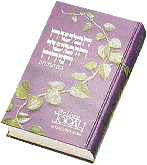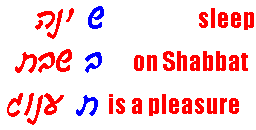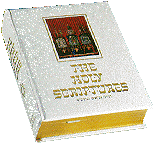
 TEFILAT SHACHARIT
TEFILAT SHACHARIT TEFILAT MUSSAF
TEFILAT MUSSAF TEFILAT MINCHA
TEFILAT MINCHA
 TEFILAT SHACHARIT
TEFILAT SHACHARIT TEFILAT MUSSAF
TEFILAT MUSSAF TEFILAT MINCHA
TEFILAT MINCHA

 The Shabbat morning prayer begin later than on weekdays, since "Sleep on Shabbat is a pleasure". Proof was found to uphold this from the Torah, since the Shabbat sacrifice was not brought early in the morning.
The Shabbat morning prayer begin later than on weekdays, since "Sleep on Shabbat is a pleasure". Proof was found to uphold this from the Torah, since the Shabbat sacrifice was not brought early in the morning.

The Shabbat morning service is different than on weekdays:
 In the morning blessing, we add verses relating to the Shabbat sacrifices
In the morning blessing, we add verses relating to the Shabbat sacrifices
 In the Pesukei Dezimra we add chapters from Tehilim. These were added
In the Pesukei Dezimra we add chapters from Tehilim. These were added The blessing before the Shema are similar to those of the weekday, but the
The blessing before the Shema are similar to those of the weekday, but the Hakol Yoducha
Hakol Yoducha
 Kel Adon
Kel Adon
 Lakel Asher Shavat
Lakel Asher Shavat
 The morning Amida contains the blessing of Yismach Moshe.
The morning Amida contains the blessing of Yismach Moshe.
Mussaf is said after Shacharit. This prayer is mentioned in Tosefta:
This service was based on the first and last three blessings of the Amida, but after the Beit Hamikdash was destroyed, the order of the Mussaf sacrifice was added. "One who recites the Mussaf parayer may do so whether the daily sacrifice was already brought or even if it was not yet brought up (Tosefta Brachot 3:2).
"One who recites the Mussaf parayer may do so whether the daily sacrifice was already brought or even if it was not yet brought up (Tosefta Brachot 3:2).

 Even though we have drunk, we continue to offer up our prayers to you.
Even though we have drunk, we continue to offer up our prayers to you.
The main prayer of the Mincha service is the Amida:
"You are One and Your name is One and who is like Your nation Israel, a unique nation in the world."
This paragraph is based on two excerpts:
 "Hashem has avouched you this day to be your G-D" (Devarim 26:18.
"Hashem has avouched you this day to be your G-D" (Devarim 26:18.
 Three partners vouch for one another: Israel, Shabbat and Hashem.
Three partners vouch for one another: Israel, Shabbat and Hashem.
After the repetition of the Chazan we say: "Tzidkatcha tzedek". These three verse serve as our bowing before divine justice.